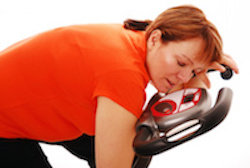 Good sleep is essential to a well-functioning body – both physically and emotionally. Being ‘tired’ can be a state of being, when you feel over-pressed, but actual sleep deprivation can be measured with certain symptoms. Do you suffer from any of these regularly? If so, you may be sleep deprived. If you have established there is nothing physical (illness, medication, diet etc) or emotional (depression, anxiety, relationship or family issues) preventing your sleep, it may be a good idea to see your GP.
Good sleep is essential to a well-functioning body – both physically and emotionally. Being ‘tired’ can be a state of being, when you feel over-pressed, but actual sleep deprivation can be measured with certain symptoms. Do you suffer from any of these regularly? If so, you may be sleep deprived. If you have established there is nothing physical (illness, medication, diet etc) or emotional (depression, anxiety, relationship or family issues) preventing your sleep, it may be a good idea to see your GP.
Chronic lack of sleep may affect your immunity, concentration and general wellbeing. Make quality sleep a priority in your life.
Gnawing Hunger
Hunger is triggered when you need to eat, obviously, but a lack of sleep can also cause your body to signal hunger – it is trying to make up for the extra energy required to keep going when you are tired. In particular, you may crave high sugar or other comfort foods. Running low on rest can increase the production of ghrelin, also known as the hunger hormone, in your gut. Too much ghrelin makes your body crave fatty and sugary food. Poor sleep can also mess with leptin, the satiety or ‘fullness’ hormone. You may actually not know when you’re full if you are chronically tired.
This sleep-related hunger can cause your body to store weight more easily. It may also interfere with healthy insulin production, which is particularly problematic for diabetics.
Impulse Control
A constant state of tiredness can affect your brain’s ability to see reason, and to act accordingly. Have you ever pulled an all-nighter with a sick child, or at work, and felt slightly ‘drunk or hungover’ the next day. There is a good reason road safety campaigners remind drivers to rest regularly – your reaction time slows and your judgement is impaired when you are tired.
You will also notice a reduction in memory and the ability to make decisions you are tired. Sleeping allows your brain time to recharge and ‘detox,’ – don’t miss out!
Co-ordination problems
When your brain function is compromised, so are your gross motor skills. You are more likely to fall, trip burn, cut or otherwise hurt yourself if you are low on sleep. Sometimes a lack of sleep cannot be avoided, so remind yourself not to try complex physical tasks if you know you are tired.
Emotional balance
We all know how easy it is to over-react when you feel sleepy. We are no different from our children and grandchildren in that regard. To avoid making mountains out of molehills, exacerbating depression or affecting your relationships with others: make good sleep a priority. If you feel overly emotional, explain that you are tired and postpone emotionally-charged conversations until you have had some rest.
Endless sniffles
You immune system is not as effective when you are tired. Research shows that when it comes to the common cold, those who regularly sleep less than seven hours a night can be up to three times more susceptible to cold bugs than those who get adequate shut-eye.
Similarly, your vision may suffer (temporarily) while you are tired and you are more likely to experience headaches.
Good sleep habits can be developed and need to be prioritised for good health. In the first instance, try:
- Limiting caffeine and alcohol in the evening
- Establishing a regular bedtime
- Turning off electronics and read a book or listen to music to relax
- Taking regular exercise during the day to promote sleep
- Asking for professional help if sleep remains elusive









Joybel - 9 years ago
We are told that as we become older, we do not require as much sleep. I am a night owl though some nights I can be asleep by ten PM. Bet your bottom dollar I will wake and guess the time before turning on the light. Yep! It is between one and two am. I will read long into the night and manage about three to four hours. Comfort is the main need with arthritic knees and a Woolworths bladder. But then I have all day to please myself, don’t I? A good time to watch tennis or athletics or a documentary.To each his own sleep habits.